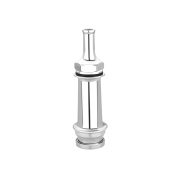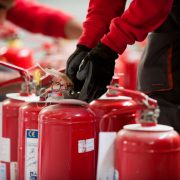When it comes to protecting lives and property, fire safety should never be taken lightly. Fire equipment, whether it’s fire extinguishers, alarms, sprinklers, or suppression systems, plays a vital role in ensuring that your home, office, or business is equipped to handle emergencies. However, like any mechanical system, fire safety equipment is prone to wear and tear.
Regular fire equipment repair is essential to ensure these systems perform efficiently when needed most. In this blog, we’ll explore why fire equipment repair is so important, how neglecting repairs can lead to dangerous failures, and how regular maintenance can keep your systems in top shape.
The Importance of Fire Equipment Repair
Fire safety equipment is designed to provide a quick response in case of fire emergencies. However, if this equipment is damaged, outdated, or improperly maintained, it can fail when you need it most. Think about a fire extinguisher that hasn’t been properly serviced. A lack of pressure, expired chemicals, or physical damage could prevent it from working when needed, leading to dire consequences. Fire alarms and sprinkler systems also rely on functional components to detect smoke or activate fire suppression. If these systems are not in top condition, the response time may be delayed, putting lives and property at risk.
In essence, fire equipment repair isn’t just about fixing a broken tool; it’s about preserving safety. Regular checks and prompt repairs help ensure that fire safety systems are ready to spring into action at a moment’s notice, which is why it’s essential for both businesses and homeowners to stay on top of this responsibility.
Common Causes of Fire Equipment Failures
Several factors can contribute to the failure of fire safety equipment, many of which can be prevented with regular fire equipment repair and maintenance. Some common causes include:
1. Wear and Tear
Fire equipment is often subjected to harsh conditions. Extinguishers can get knocked around, alarms may experience power surges, and sprinkler systems can suffer from corrosion or physical damage. Over time, these issues can cause a malfunction or complete failure of the equipment. Fire Extinguisher Service Ft Worth can help ensure that your extinguishers remain in good working condition, preventing these potential failures and enhancing overall safety.
2. Lack of Regular Maintenance
Fire equipment needs to be checked and serviced regularly to ensure that it’s functioning properly. Failing to conduct regular inspections can allow small issues to go unnoticed until they become larger, more dangerous problems. For example, fire extinguishers require annual checks for pressure and the condition of seals and nozzles, while alarms need to be tested to make sure the batteries are working.
3. Environmental Factors
Extreme temperatures, humidity, or exposure to chemicals can affect the functionality of fire safety equipment. Fire extinguishers stored in garages or basements may be exposed to conditions that cause rust, corrosion, or degradation of internal components. Similarly, fire alarm systems can be affected by dust, dirt, or moisture, all of which can compromise their ability to detect smoke and fire.
4. Expired Equipment
Fire equipment like extinguishers, alarms, and suppression systems have expiration dates. If these systems are not replaced or repaired when they expire, they may not function correctly in an emergency. The chemicals in a fire extinguisher, for example, may lose their effectiveness over time, rendering the device useless.
How Fire Equipment Repair Prevents Dangerous Failures
By ensuring that fire equipment is in good working order through regular repairs and maintenance, you can significantly reduce the risk of dangerous failures. Here’s how:
1. Early Detection of Issues
Scheduled inspections allow professionals to identify potential issues before they become major problems. A small leak in an extinguisher, a worn-out battery in an alarm, or a corroded sprinkler pipe can all be addressed before they lead to catastrophic failure. Early detection is key to preventing equipment from malfunctioning when it’s most needed.
2. Increased Reliability
Fire equipment repair ensures that systems work properly when activated. Regular maintenance keeps parts in good condition, ensuring reliable performance during emergencies. Whether it’s recharging an extinguisher, testing fire alarms, or replacing faulty components in a sprinkler system, proactive repairs make sure the equipment is ready to save lives.
3. Compliance with Safety Regulations
In many regions, businesses and homeowners are required by law to maintain fire safety equipment. Regular inspections and repairs are not only vital for safety but are also necessary for compliance with local fire codes and regulations. Neglecting fire equipment repair can result in fines, penalties, or, more critically, increased liability in the event of a fire-related incident.
4. Preventing Costly Damage
While repairs might seem like an added expense, neglecting fire equipment maintenance can result in much more significant costs. A fire that spreads due to non-functional equipment can destroy property, cause injury, or even result in loss of life. The financial and emotional costs of such damage far outweigh the investment in regular fire equipment repair.
How to Ensure Your Fire Equipment is Properly Maintained
To keep your fire safety systems in optimal condition, follow these best practices:
1. Schedule Regular Inspections
Set up annual or bi-annual inspections for your fire equipment, depending on the type and local regulations. This ensures that any minor issues are addressed before they lead to failures. Work with certified fire safety professionals who have experience diagnosing and repairing fire systems.
2. Replace Expired Equipment
Be proactive in replacing expired equipment, whether it’s extinguishers, alarms, or suppression systems. Check expiration dates and plan for timely replacements to avoid using outdated, ineffective systems.
3. Store Equipment Properly
Ensure that fire equipment is stored in appropriate conditions. For example, store fire extinguishers in dry, cool places away from heat sources and chemicals. Keep alarms and sprinklers free from dust, dirt, and moisture to maintain their functionality.
4. Invest in Professional Repairs
When repairs are needed, trust professionals to handle the job. DIY fixes may not provide the level of care and expertise required to maintain the equipment. A certified repair technician can ensure that the equipment is properly serviced, tested, and recharged.
Conclusion
Fire equipment repair is crucial for ensuring the effectiveness of your fire safety systems. Neglecting to maintain these systems can lead to dangerous failures, putting lives, property, and businesses at risk. By investing in regular inspections, repairs, and replacements, you can ensure that your equipment is ready to perform in the event of an emergency. Don’t wait until it’s too late—take action now to prevent dangerous failures and safeguard what matters most.
Also Read: Why Fire Extinguisher Training Classes Are a Must









Comments